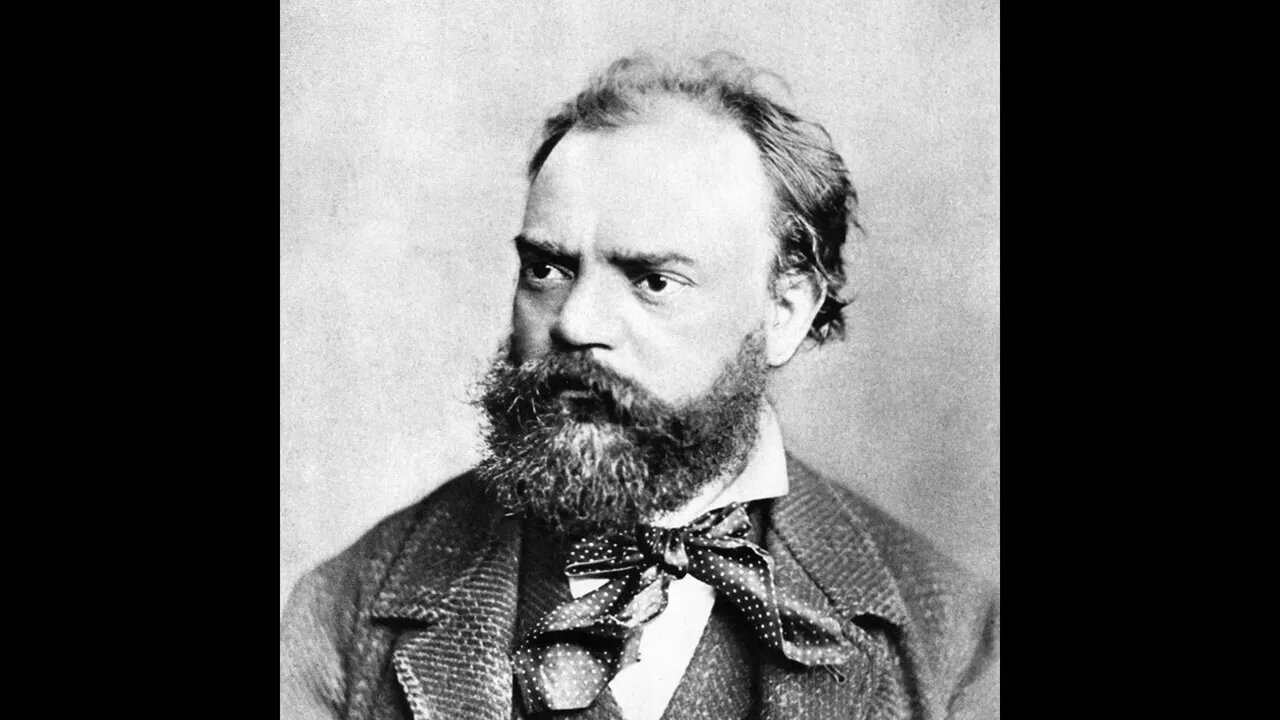Premium Only Content

Antonín Dvořák - Legends, Op 59 2 Molto moderato G major Orchestral version, B 122
Antonín Dvořák - Legends, Op 59 2 Molto moderato G major Orchestral version, B 122
Performed by Waterloo-Cedar Falls Symphony
🔔 🔔 🔔
If you appreciate my work, please push 👍 and subscribe to my YouTube channel in one click https://tinyurl.com/msfrb6wn 😉
Antonín Leopold Dvořák (8 September 1841 – 1 May 1904) was one of the first Czech composers to achieve worldwide recognition. Dvořák frequently employed rhythms and other aspects of the folk music of Moravia and his native Bohemia, following the Romantic-era nationalist example of his predecessor Bedřich Smetana. Dvořák's style has been described as "the fullest recreation of a national idiom with that of the symphonic tradition, absorbing folk influences and finding effective ways of using them".
Dvořák displayed his musical gifts at an early age, being an apt violin student from age six. The first public performances of his works were in Prague in 1872 and, with special success, in 1873, when he was 31 years old. Seeking recognition beyond the Prague area, he submitted a score of his First Symphony to a prize competition in Germany, but did not win, and the unreturned manuscript was lost until rediscovered many decades later. In 1874 he made a submission to the Austrian State Prize for Composition, including scores of two further symphonies and other works. Although Dvořák was not aware of it, Johannes Brahms was the leading member of the jury and was highly impressed. The prize was awarded to Dvořák in 1874[a] and again in 1876 and in 1877, when Brahms and the prominent critic Eduard Hanslick, also a member of the jury, made themselves known to him. Brahms recommended Dvořák to his publisher, Simrock, who soon afterward commissioned what became the Slavonic Dances, Op. 46. These were highly praised by the Berlin music critic Louis Ehlert in 1878, the sheet music (of the original piano 4-hands version) had excellent sales, and Dvořák's international reputation was launched at last.
Dvořák's first piece of a religious nature, his setting of Stabat Mater, was premiered in Prague in 1880. It was very successfully performed in London in 1883, leading to many other performances in the United Kingdom and United States. In his career, Dvořák made nine invited visits to England, often conducting performances of his own works. His Seventh Symphony was written for London. Visiting Russia in March 1890, he conducted concerts of his own music in Moscow and Saint Petersburg. In 1891 Dvořák was appointed as a professor at the Prague Conservatory. In 1890–91, he wrote his Dumky Trio, one of his most successful chamber music pieces.
In 1892, Dvořák moved to the United States and became the director of the National Conservatory of Music of America in New York City. The President of the National Conservatory of Music in America, Jeannette Thurber, offered Dvořák an annual salary of $15,000– twenty-five times what he was paid at the Prague Conservatory. While in the United States, Dvořák wrote his two most successful orchestral works: the Symphony From the New World, which spread his reputation worldwide, and his Cello Concerto, one of the most highly regarded of all cello concerti. In the summer of 1893, Dvořák moved from New York City to Spillville, Iowa, following the advice of his secretary, J.J. Kovarík. Dvořák had originally planned to come back to Bohemia, but Spillville was made up of mostly Czech immigrants, and thus he felt less homesick; Dvořák referred to it as his "summer Vysoka." This is where he wrote his most famous piece of chamber music, his String Quartet in F major, Op. 96, which was later nicknamed the American Quartet. Shortly after his time in Iowa, Dvorák extended his contract at the National Conservatory for another two years. However, the economic crisis of April 1893 resulted in Thurber's husband's loss of income, and directly influenced the National Conservatory's funding. But shortfalls in payment of his salary, along with increasing recognition in Europe and an onset of homesickness, led him to leave the United States and return to Bohemia in 1895.
All of Dvořák's nine operas, except his first, have librettos in Czech and were intended to convey the Czech national spirit, as were some of his choral works. By far the most successful of the operas is Rusalka. Among his smaller works, the seventh Humoresque and the song "Songs My Mother Taught Me" are also widely performed and recorded. He has been described as "arguably the most versatile... composer of his time".
The Dvořák Prague International Music Festival is a major series of concerts held annually to celebrate Dvořák's life and works.
(Source: Wikipedia)
-
 1:31
1:31
The Best of Classical Music
2 years agoMuzio Clementi - Sonatina N 1 2 Mov Andante
281 -
 8:08
8:08
Guns & Gadgets 2nd Amendment News
2 days ago16 States Join Forces To Sue Firearm Manufacturers Out of Business - 1st Target = GLOCK
50.9K51 -
 10:17
10:17
Dermatologist Dr. Dustin Portela
1 day ago $6.35 earnedOlay Cleansing Melts: Dermatologist's Honest Review
43.3K -
 1:02:20
1:02:20
Trumpet Daily
1 day ago $23.55 earnedObama’s Fake World Comes Crashing Down - Trumpet Daily | Dec. 20, 2024
27.3K34 -
 6:29
6:29
BIG NEM
21 hours agoCultivating God Mode: Ancient Taoist NoFap Practices
21.2K6 -
 30:53
30:53
Uncommon Sense In Current Times
1 day ago $6.01 earned"Pardon or Peril? How Biden’s Clemency Actions Could Backfire"
42.6K2 -
 40:01
40:01
CarlCrusher
19 hours agoSkinwalker Encounters in the Haunted Canyons of Magic Mesa - ep 4
40.9K2 -
 59:44
59:44
PMG
1 day ago $4.29 earned"BETRAYAL - Johnson's New Spending Bill EXPANDS COVID Plandemic Powers"
50.2K17 -
 6:48:50
6:48:50
Akademiks
17 hours agoKendrick Lamar and SZA disses Drake and BIG AK? HOLD UP! Diddy, Durk, JayZ update. Travis Hunter RUN
172K28 -
 11:45:14
11:45:14
Right Side Broadcasting Network
9 days agoLIVE REPLAY: TPUSA's America Fest Conference: Day Three - 12/21/24
355K28